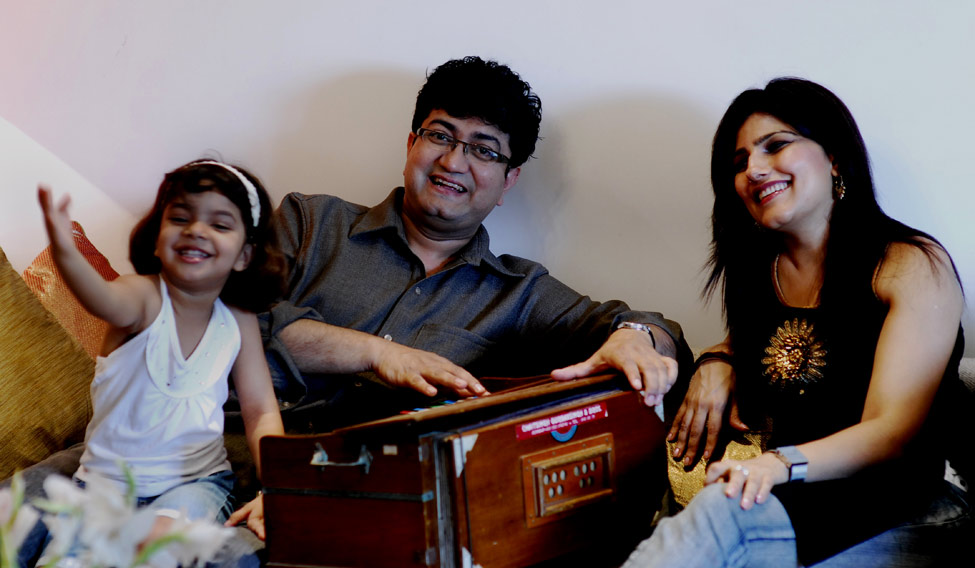Over 15 years ago a rookie at an advertising agency landed an assignment to pen a radio spot for Nokia. It was hardly anything to gloat over. Radio spots were no great shakes for the creative ad folk and this one was in Hindi to boot. The copywriter, Prasoon Joshi, got the assignment primarily because he was lowest in the pecking order. He furtively worked his pen and soon had a jingle ready. The theme was maa (mother), and the ad implored the listener to pick up a Nokia phone and give maa a call.
The jingle won Prasoon Joshi the first of his 400-plus awards in advertising. "Yes, maa has always been there for me," he says, chuckling at the memory. Prasoon has since explored different nuances of the maa-beta relationship in his lyrics be it the pain of loss coming across so poignantly in the song Luka chhupi bahut hui (Rang De Basanti) or in Tujhe sab hai pata, hai na ma (Taare Zameen Par). He has infused Hindi film lyrics with a poetic vocabulary that's so everyday that you wonder why others couldn't do it before.
"I believe my language is different because I didn't grow up with too much cinema," says Prasoon. "Itwas looked down upon in my family where classical music was appreciated and classic literature read. When I joined the industry I was told no one would understand poetry. I feel it's a misconception that the youth don't appreciate good poetry or music. What they actually want is movement, not stagnation." He clearly has his finger on the nation's pulse—everyone is singing his tunes, whether in fancy nightclubs or touring trucks. And his jingles sell everything from Happydent chewing gum to Coca-Cola.
How do his folks react to the sensation called Prasoon Joshi? "My parents are far removed from this world," he says. "They are, of course, proud that I'm doing well, but I wonder if they fully know what I do." He recalls that when he first started working, his parents had little idea about his work in the 'publicity' business. For a long time, they believed it entailed sticking posters and distributing pamphlets.
Prasoon has great respect for film songs. "Indian history has always been passed down orally, through story-tellers," he says. "Today it is film songs that are chronicling our times. Songs also help express emotions that society doesn't allow conversations to express. Take Aaj sajan mohe ang laga h.... The heroine is actually telling the hero to make love to her, which she would never have otherwise said so directly."
When he was 17, his first book—a collection of poems—was published. He does a bit of writing every day no matter where he is. He is also a trained singer, whom Lata Mangeshkar has urged to cut an album or sing playback. "I cannot be boxed into any compartment," says the poet, lyricist, copywriter, dialogue writer and singer. "Amir Khusrau was a Sufisaintwho wrote beautiful verse, made wonder-Collective creativity: Prasoon Joshi with wife, Aparna, and daughter, Aishaanya ful music and also penned limericks that are still popular. Can you define Khusrau completely by naming just a single talent? I represent a brand called 'creativity'."
A pompous statement maybe, but it is balanced by an outlook that considers no work infra dig. "I put the same effort into a pamphlet as in a book," he says. "Najaane kis vesh mein Narayan miljaaye [You never know which form the Creator may take to meet you]." Prasoon feels what started as another medium of expression is now an integral part of his life. So has he, too, succumbed to Bollywood's lure? "There are two Bollywoods in this industry," he says. "One is feudal, campish and inward looking. The other is ever-flowing with fresh ideas, seeking new relationships. I identify with the latter."
Yet, he's forged some strong relationships. He's worked and bonded well with Aamir Khan, A.R. Rahman and Rakyesh Omprakash Mehra. "I guess I've been lucky to have found so many people I can work in synchrony with," says Prasoon. "From Rahman I've learnt to surrender, and from Aamir to take myself even more seriously than I did. I don't consider their involvement in my work interference."
"Prasoon has defined today's times," says Mehra. "He brought Hindi into vogue in advertising, poetry into cinema and film songs into upmarket restaurants and discos. He will always be integral to my work and completes my creative being, filling the lacuna of poetry." Says wife, Aparna: "He's enjoying cinema. It has given him such phenomenal connect with people. The other day a woman who has been fighting disease for long called up to say how Masakkali had given her zest at a very low point." But she also says that cinema is just one of his canvasses for creative expression. "His mind is always creating something, whether it is a romantic poem to impress me or limericks to tease his sisters," she says.
"I've known him for 15 years and am still amazed at how much he absorbs from his environment. He even reads management books and draws philosophical conclusions. Professionally, too, he's different. If a project was scrapped after we've slogged at it we'd all be disappointed. He, however, has always been comfortable with restarting, trying things differently." An active gamer, he can be amazed by the creativity of the person who crafts the plot of a video game. When Second Life was all the rage, he created a virtual office on it.
But, for all his connect, Prasoon is still the lad from Almora, valiantly struggling to keep the innocence of his mountain heritage alive in Mumbai. "In the hills, the struggle is against nature, which makes you resilient, not smart," he says. "In Mumbai, the opponent is another human, and even if you win, you only become shyana [streetsmart]. I don't ever want to become a shyana," he says, muttering a fervent prayer, perhaps to a mountain spirit.









